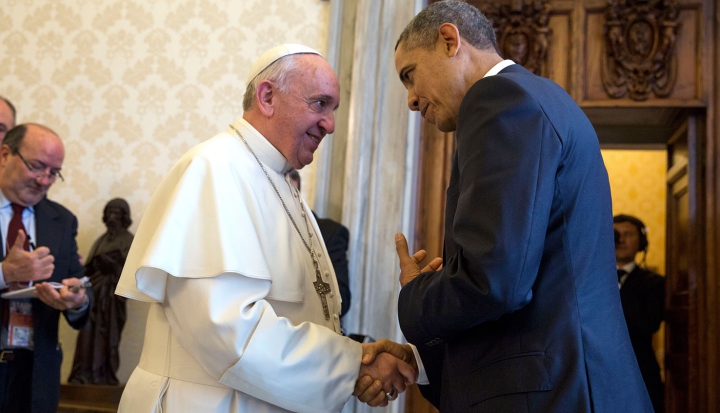c. 2014 Religion News Service
VATICAN CITY (RNS) Pope Francis welcomed the renewal of diplomatic relations between the U.S. and Cuba on Thursday (December 18), saying he was happy to see an end to a half-century standoff between the two nations. But it was left to others at the Vatican to explain what a crucial role Francis himself played in bringing about a revolutionary change in the Cold War-era relationship.
Addressing several new ambassadors as they presented their credentials to the Holy See, Francis stressed that the work of an ambassador was about taking “small steps … that always end up making peace, getting close to the hearts of the people, promoting brotherhood.”
“Today we are all happy because we have seen how two peoples, who were far apart for many years, yesterday took a step to get closer,” the pope told the ambassadors from 13 countries. Earlier Thursday, during morning Mass at the St. Marta residence at the Vatican, the pope spoke about salvation, noting “step by step, history is made.”
Francis, who turned 78 on Wednesday as the deal was announced, acted as the chief advocate for renewing diplomatic ties between Washington and Havana, Vatican officials said. The Vatican’s secretary of state, Cardinal Pietro Parolin, confirmed Thursday that the pope’s role was “very significant” and reflected the importance Francis placed on facilitating dialogue since he was elected last year.
“He has stressed the importance for groups and people to meet together, what we have called the culture of encounter,” Parolin told Vatican Radio. “The Holy See tried to facilitate the dialogue between the two parties according to the objectives that Pope Francis has given to the Holy See. It has a new emphasis … which is to build bridges between persons, groups and nations.”
Parolin confirmed that the pope had made a personal plea in letters he wrote to President Obama and the president’s Cuban counterpart, Raul Castro, “stressing the importance of finding a solution to their historical differences.”
The Vatican has declined to say how many rounds of diplomatic talks took place or how many personnel were involved. But on Wednesday, a statement confirmed it had received delegations from the two countries at the Vatican in October and provided offices for “constructive dialogue on delicate matters, resulting in solutions acceptable to both parties.”
One Vatican insider said the breakthrough in relations had given the pope “huge moral credibility” and even hinted that his desire for dialogue with those who did not share the views of the Catholic Church could yield more surprises in the future.
“People say this is because he is Latin American. It helps, but he’s not a diplomat by training. He’s very much into talking with everybody, even those with whom we have our differences,” the source said, speaking on condition of anonymity. “The Holy See takes the long view. There is a lot of quiet diplomacy going on.”
The Catholic Church has always kept its diplomatic channels open with Cuba despite ongoing concerns about human rights and opposition to the U.S. trade embargo. This year, the Vatican and Cuba marked 79 years of official diplomatic relations. Visits to Cuba by Francis’ predecessors, St. John Paul II and Pope Emeritus Benedict XVI, are believed to have contributed also to this week’s dramatic breakthrough.
Morozzo della Rocca, history professor at Roma Tre University in Rome, said both John Paul and Benedict were criticized for giving “a sort of recognition” to the regime through their visits, but he stressed they were decisive diplomatically. “For Cuba, it was a demonstration that the Holy See was an important mediator,” he told the Italian bishops’ daily, Avvenire. “They were pastoral visits about peace, not politics.”
Still, it was a Latin American pope from Buenos Aires who finally broke down the barriers between the two nations. “He is the first pope to come from the South American continent,” former Vatican spokesman Joaquin Navarro-Valls wrote in the Italian daily La Repubblica. “It’s a sign of providence for those who believe in the providence of history for everyone.”
Image: President Barack Obama meeting with Pope Francis at the Vatican in March 2014. Official White House Photo by Pete Souza, via Flickr. United States government work.














Add comment